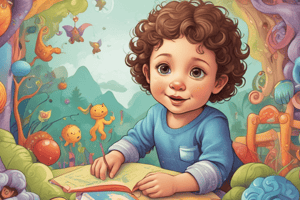Podcast
Questions and Answers
At what age can a child usually speak clearly and fluently in an easy-to-listen-to voice?
At what age can a child usually speak clearly and fluently in an easy-to-listen-to voice?
- 8-9 years
- 6-7 years
- 2-3 years
- 4-5 years (correct)
What can a 4-5 year old child do with sentences?
What can a 4-5 year old child do with sentences?
- Use only single words
- Construct long and detailed sentences (correct)
- Construct simple sentences
- Tell a short, simple story
What should you do if you are in doubt about your child's hearing?
What should you do if you are in doubt about your child's hearing?
- Consult a speech-language pathologist
- Wait and observe for a few months
- See a clinical audiologist (correct)
- Take your child to a pediatrician
At what age can a child understand nearly everything said at home or in pre-school?
At what age can a child understand nearly everything said at home or in pre-school?
What can a 4-5 year old child do with stories?
What can a 4-5 year old child do with stories?
What is a characteristic of a 4-5 year old child's speech?
What is a characteristic of a 4-5 year old child's speech?
What can a 4-5 year old child do in conversation?
What can a 4-5 year old child do in conversation?
What type of stories may a 4-5 year old child tell?
What type of stories may a 4-5 year old child tell?
At what age do children typically start using dictionaries to learn the meaning of words?
At what age do children typically start using dictionaries to learn the meaning of words?
What is the primary way children learn new words through direct instruction?
What is the primary way children learn new words through direct instruction?
Which language development stage is characterized by the use of correct grammar and parts of speech?
Which language development stage is characterized by the use of correct grammar and parts of speech?
What can affect language and speech development across the life span?
What can affect language and speech development across the life span?
In which stage of language development do individuals maintain or improve their knowledge of words and word meanings?
In which stage of language development do individuals maintain or improve their knowledge of words and word meanings?
What is the primary purpose of language and speech development in children?
What is the primary purpose of language and speech development in children?
What is the role of morphological analysis in language development?
What is the role of morphological analysis in language development?
What is a common challenge faced by individuals in old age (60+ years) in terms of language development?
What is a common challenge faced by individuals in old age (60+ years) in terms of language development?
What is the primary focus of receptive language in children?
What is the primary focus of receptive language in children?
At what stage does language learning typically start in children?
At what stage does language learning typically start in children?
What is the term for the use of language through speech, sign, or alternative forms of communication?
What is the term for the use of language through speech, sign, or alternative forms of communication?
What is a key aspect of nursing skills when communicating with clients across the life span?
What is a key aspect of nursing skills when communicating with clients across the life span?
What is a common consequence of stereotyping clients based on age?
What is a common consequence of stereotyping clients based on age?
What is a key aspect of communication with clients who have disabilities?
What is a key aspect of communication with clients who have disabilities?
What is a key aspect of speech fluency in children?
What is a key aspect of speech fluency in children?
What is a potential challenge for nurses communicating with clients who have hearing difficulties?
What is a potential challenge for nurses communicating with clients who have hearing difficulties?
Flashcards are hidden until you start studying
Study Notes
Language Development in Children (0-5 years)
- Language development starts at birth and is critical for exchanging information with others.
- Receptive language (understanding) and expressive language (using language) are two main areas of language development.
Language Development in Children (0-5 years)
- By 4-5 years, children:
- Enjoy stories and can answer simple questions about them.
- Speak clearly and fluently in an easy-to-listen voice.
- Understand nearly everything that is said at home or pre-school.
- Can construct long and detailed sentences, using "adult-like" grammar.
- Most sounds are pronounced correctly, though some may still have difficulty with "r", "v", and "th".
- Can communicate easily with familiar adults and other children.
Hearing Difficulties
- Hearing difficulties may become evident in children aged 4-5 years.
- If in doubt about a child's hearing, see a clinical audiologist.
Language Development in School Age (6-12 years)
- Lexical development: Children learn new words through:
- Direct instruction
- Contextual abstraction
- Morphological analysis
- Children use context clues and morphemes to infer word meanings.
Language Development in Adolescents (10-19 years)
- Improved communication and skills
- Using correct grammar and parts of speech
- Middle adolescents use a lot of slang language
- Late adolescents are comparable to adults in language skills
Language Development in Adults (19-59 years)
- Maintain or improve knowledge of words and word meanings
- May have language difficulties or speech deficits
- May experience hearing impairment
Language Development in Old Age (60+ years)
- Maintain or improve knowledge of words and word meanings
- May have language difficulties or speech deficits
- May experience hearing impairment
Studying That Suits You
Use AI to generate personalized quizzes and flashcards to suit your learning preferences.




